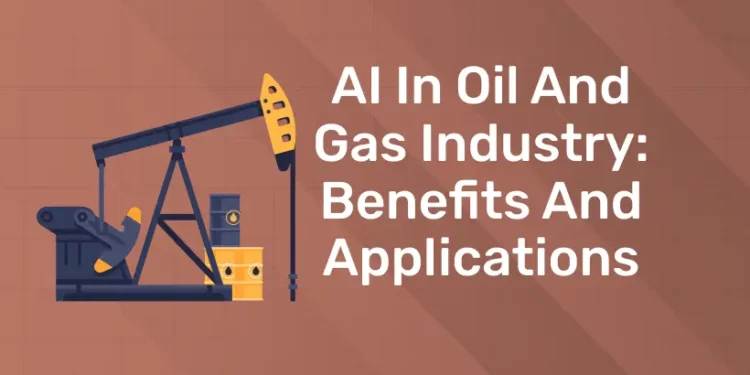Table of Contents
AI Oil and Gas applications
In this article, we will read about the various fascinating ways people use AI in oil and gas applications to improve their business.
Accelerating the discovery of natural gas and crude oil
Finding the best places to extract natural gas and crude oil is time consuming process.
As the amount of data used increases, Artificial Intelligence tools improve their performance. Oil and gas artificial intelligence applications can gather information about an area’s geology, geophysics and others.
Detecting oil well and pipeline leaks
Leaks from oil wells and pipelines occur very frequently than people outside of oil and gas companies may expect.
That’s why leak detection is an AI application and gas industry professionals are particularly interested in pursuing this career. These applications can are ideal for monitoring pipelines and oil wells in remote areas. Those locations usually don’t have humans present all the time and everywhere.
Reducing maintenance costs
Many applications of AI in oil and gas focus on helping users reduce costs and avoid unwanted outcomes. One of the ways they do that is through predictive maintenance. It involves placing connected sensors on oil and gas equipment and deploying algorithms that learn what constitutes normal behavior.
Maintenance-based AI applications in oil and gas fundamentally change how people handle the upkeep of critical equipment by helping them become more proactive.
Cleaning oil spills
Prompt responses to oil spills are essential for minimizing environmental damage and mitigating resource losses. Experts use various methods to tackle oil spills, depending on if it happens at sea or on the shore.
Chemical dispersion and skimming are the two options for removing oil from the water surface. Once the oil reaches land, cleaning crews use industrial vacuum trucks and special sponges to soak it up.
Furthermore, an emerging option is to use AI-powered robots to assist with the efforts. Scientists are interested in using the machines as swarms, enabling dozens or more robots work towards a shared goal.
This application of AI in oil and gas industry tasks could reduce the number of people needed to clean up after an oil spill. It will also help to get the job done more efficiently, limiting the adverse effects.
Improving plant safety
To work in the oil and gas industry means accepting inherent hazards and following the correct procedures.
However, things go wrong even when employees consistently remain perfect, aware of their surroundings and alert to potential problems. Choosing appropriate ways to use AI in oil and gas industry companies can improve safety by enhancing visibility.
Additionally, some oil and gas workers receive wearables that gather information in real time and alert them to dangers they would otherwise not notice until it’s too late.
Start your career in Oil and Gas field!! Join Now!
Managing quality control needs
Quality control shortcomings can be very crucial for companies in the gas and oil sector, particularly when people discover those issues relatively late in a project’s workflow.
Some companies also use computer vision to supplement the visual checks that humans do. Adding strategic steps to a quality control process with human input and artificial intelligence is an excellent way to promote company resilience.
Enhancing worker training
Preparing employees for the oil and gas industry means ensuring they have the right workforce education to be adequately equipped for their roles. Artificial intelligence applications in oil and gas industry education can make employee training more personalized by detecting which topics a person should know well.
Providing the right educational content with AI applications can also lead to empowered employees. Then, organizations can reduce costs and improve job retention, along with other benefits.
Strengthening cybersecurity
Cybersecurity experts warn that the oil and gas industry is a prime target for online criminals. That is why many leaders approach AI development specialists to learn about ways to build their cyber defenses. Such applications of artificial intelligence in this industry enable screening networks for signs of unusual activity.
Tracking sustainability efforts
Artificial intelligence use in oil and gas can help leaders operate more sustainably. This sector is like most others in that national and state governments have tasked it with gradually reducing its emissions to meet published targets.
Many corporate leaders have made AI and machine learning part of their digital transformation strategies, knowing that doing so could mean taking a significant step toward better sustainability.
Handling inspections
Any application of AI in oil and gas industry workflows should ideally be connected to several overarching company goals. It is then easier to justify the associated investments of hiring a machine learning consulting firm, deploying the solution and setting aside the time for employees to learn to use it.
Reducing manual tasks
Even the most efficient workers often make mistakes while engaging in manual tasks. That could happen due to carelessness or calculation errors. However, a well-built application of artificial intelligence in oil and gas industry responsibilities could reduce mistakes.
For instance, artificial intelligence in oil rig robots can collect information about equipment and environment.
Get Certified! Get Confident! Join our Oil and Gas Course!
Artificial intelligence in oil and gas is gaining momentum
1: What is the primary purpose of a refinery in the oil and gas industry?
The oil and gas industry was not an early adopter of artificial intelligence.
However, more of the leaders in this sector realize that things must change. Many of them choose AI to facilitate that progress. That might mean building a machine learning model to predict outcomes before approving an oil rig deployment. It could also involve using AI to reshape maintenance processes, safety procedures and employee training.
AI Oil and Gas benefits
Some other uses of artificial intelligence in the Oil and Gas Industries are:
- Backoffice Process Optimization
- Smart Inventory Management
- Surface Analysis/Geological Assessment
- Optimizing Production and Scheduling
- Reducing Well and other Equipment Downtime
- Using Digital Twins for Asset Tracking and Maintenance
- Artificial Intelligence led Cybersecurity
- Tracking of Emissions
- Logistics Network Optimizations and Logistics
Use of AI in other industries
Detecting and Preventing Fraud
The ability of artificial intelligence to recognize patterns enables it to play a critical role in the development of financial technology. Financial and credit organizations are using AI to detect fraudulent activity and secure money and data of their clients. It could be several days before a cardholder realizes that there was an unusual transaction made on their account. On the other hand, an AI can rapidly recognize suspicious conduct and take required action. For example, it may recognize that a transaction does not correspond to the usual things that a person buys and question why this has occurred.
When the AI detects purchase activity like this, it will put a hold on the transaction to validate whether it is correct before allowing it to proceed.
Anticipating the Need for Maintenance
It is necessary to perform daily maintenance on industrial vehicles such as those used in the construction industry to keep them operating. Considering the size and complexity of these vehicles, significant repairs can be highly expensive.
AI is making maintenance much more safer and cheaper to perform. AI can monitor a vehicle’s performance over time and identify fluctuations in that performance that may suggest the need for repair with the use of sensors connected to the internet of things (IoT).
Enhanced focus on quality control
Nowadays , it is harder to keep up with demand since an increasing number of companies are having trouble in finding qualified workers. To satisfy the needs of their customers without lowering their standards, manufacturers need a proper and workable answer.
Artificial intelligence is seeing a transformative effect on production lines and factories all around the world. Even a single AI-enabled camera might be mounted on a robot arm to scan a large object.
Teaching Appropriate Social Behaviors
AI companions for children are becoming a common phenomenon, even though the concept may sound like something out of a box fiction. Children are getting benefit from the use of robots powered by AI in the development of their social and life skills.
For instance, natural language processing (NLP) enables the Moxie robot to have convincing conversations with young children. It teaches essential life skills as well as critical social abilities such as consideration, empathy, and respect. Moxie will even play games with youngsters, such as sketching and meditating. More robots like Moxie will inevitably be developed in the current world as internet education and homeschooling gain popularity.
The Process of Designing Buildings
Generative design is one of the most interesting next-generation applications for artificial intelligence (AI), and it is currently being utilized to design revolutionary new structures and buildings.
One example would be identifying the optimum support system with the least amount of materials. Even architects are finding that generative design facilitates the development of original and artistic new construction concepts. In addition to being employed in the creation of buildings, generative design is also used in creating robots, dwellings on Mars, and many other consumer products.
Start your career in Oil and Gas field!! Join Now!
Conclusion
AI has played a significant role in increasing the market growth of oil and supply chains. Robots driven by autonomous artificial intelligence would be an excellent answer for exploration, as they would make the procedure more easy and hence more accurate data would be gathered.
Drones are being used by leading oil and gas corporations to capture seismic photos, while algorithms are being used for processing photographs extract information from the images. The results of these analyses are used as the basis for subsequent research. This procedure reduces the risk to human life while maximizing the data’s reliability.
FAQs
How will artificial intelligence impact upstream oil and gas?
Exploration of oil and gas reservoirs necessitates 3D imaging of the field and data processing from petrophysical and geophysical studies, including seismic surveying at the scale of the pool. AI lowered the time required to process these 3D photos, normally which are time-consuming tasks.
How does AI benefit the Oil and Gas Industry?
AI enhances operational efficiency through predictive maintenance, optimized supply chains, and accurate demand forecasting, leading to reduced downtime and improved decision-making.
What are some applications of AI in the Oil industry?
AI is applied in reservoir analysis, drilling optimization, anomaly detection in pipelines and emissions reduction, revolutionizing exploration, production, and environmental sustainability.
What is the future of AI in oil and gas?
The future of AI in oil and gas holds advanced automation, data-driven insights, and optimized operations. AI will transform production, safety, and sustainability, thereby reshaping the industry landscape.









